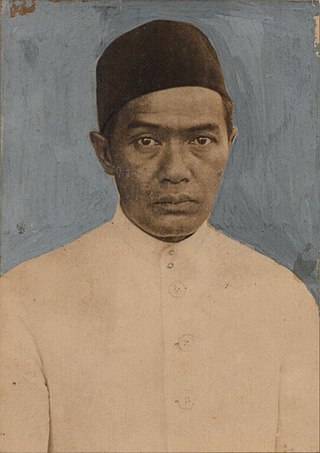Abu al-Fida Isma'il ibn Umar ibn Kathir al-Dimashqi, known simply as Ibn Kathir, was an Arab Islamic exegete, historian and scholar. An expert on tafsir, tarikh (history) and fiqh (jurisprudence), he is considered a leading authority on Sunni Islam.
Hidayatullah is an Islamic mass organization based in Indonesia, founded in 1973. It is aimed at propagation of puritanical interpretation of Islam, and dawah (proselytization). The organization operates pesantren, mass media, women's division, and coop.
Abū Hurayra ʿAbd al-Raḥmān ibn Ṣakhr al-Dawsī al-Zahrānī, commonly known as Abū Hurayra, was a companion of the Islamic prophet Muhammad and the most prolific hadith narrator in Sunni Islam.

Muhammadiyah ; officially Muhammadiyah Society is a major Islamic non-governmental organization in Indonesia. The organization was founded in 1912 by Ahmad Dahlan in the city of Yogyakarta as a reformist socioreligious movement, advocating ijtihad - individual interpretation of Qur'an and Sunnah, as opposed to Taqlid - conformity to the traditional interpretations propounded by the ulama. Since its establishment, Muhammadiyah has adopted a reformist platform mixing religious and secular education, primarily as a way to promote the upward mobility of Muslims toward a 'modern' community and to purify Indonesian Islam of local syncretic practices. It continues to support local culture and promote religious tolerance in Indonesia, while a few of its higher education institutions are attended mostly by non-Muslims, especially in East Nusa Tenggara and Papua provinces. The group also runs a large chain of charity hospitals, and operated 128 universities as of the late 1990s.
Qadar is the concept of divine destiny in Islam. As God is all-knowing and all-powerful, everything that has happened and will happen in the universe is already known. At the same time, human beings are responsible for their actions, and will be rewarded or punished accordingly on Judgement Day.
Sunan Bonang was one of the nine Wali Songo, along with his father Sunan Ampel and his brother Sunan Drajat who are said to have established Islam as the dominant religion amongst the Javanese, Indonesia's largest ethnic group.
Rabīʿ bin Hādī ʿUmayr al Madkhalī is a Saudi professor who is a former head of the Sunnah Studies Department at the Islamic University of Madinah. He is a Salafi Muslim scholar who is considered to be one of Salafism's prominent thinkers. He was most active in the 90’s and early 2000s where he received praise from other Salafi scholars like Shaykh Salih Ibn Uthaymeen and Shaykh Abdul Aziz Bin Baz. Another prominent Salafi scholar named Imam Al-Albani labelled him the Imam of Jarh Wa Tad’il, which he himself later rejected.
Muqbil bin Hadi bin Muqbil bin Qa’idah al-Hamdani al-Wadi’i al-Khallali was an Islamic scholar in Yemen. He was the founder of a Madrasa in Dammaj which was known as a centre for Salafi ideology and its multi-national student population. Muqbil was noted for his fierce criticisms of the Egyptian Islamist scholar Sayyid Qutb.

Manhaj (منهج) is an Arabic word meaning method, path or doctrine. In Islam, the systematic method of upholding Aqeedah and performing deeds is called Manhaj. It is an important part of Salafism. Salafism consists of two main areas, namely Aqidah and Manhaj. Aqidah refers to the beliefs of Salafis, while Manhaj refers to how these beliefs are practiced. Muhammad Nasiruddin al-Albani, when asked about the importance and difference between these two elements, replied that "Aqidah is more specific than Manhaj". He further emphasized that both Aqeedah and Manhaj are inseparable for one to become a Salafi and one cannot become Salafi in Aqeedah by applying Manhaj to the Ikhwani Salafi. In the case of Manhaj, it is the ideological element of modern Salafism that bears witness to differences and diversity. Some believe that Salafi Manhaj can also be seen in different forms. For example, Saleh Al-Fawzan states that manhaj means "the method of implementing the beliefs and laws of Islam" and that it comes in three different forms, namely, the method of dealing with religious sources, the method of worship or the way of worship and the way of dealing with the community or ummah.

Mas Mansoer was an Indonesian religious leader who served as the 4th chairman of Muhammadiyah from 1937 to 1942. He was declared a national hero by President Sukarno in 1964.

Habib Muhammad Rizieq bin Hussein Shihab is an Indonesian Islamist cleric, the founder and leader of the Islamist group Islamic Defenders Front, which was banned by the government in December 2020. Facing criminal charges in Indonesia, he lived in Riyadh, Saudi Arabia from 2017 to November 2020. Following his return to Indonesia, he was arrested in late 2020, accused of criminal incitement for holding crowded events that violated the COVID-19 pandemic regulations.

Jafar Umar Thalib was an Indonesian Islamist cleric. He was the head of Laskar Jihad, an Islamic fundamentalist militant organization active during the Maluku sectarian conflict.

Usman bin Yahya, Utsman ibn Yahya or Othman bin Yahya was an Islamic scholar who served as Grand Mufti of Batavia in 19th century of Dutch East Indies.

In Indonesian Islamic education, Kitab kuning refers to the traditional set of the Islamic texts used by the educational curriculum of the Islamic seminary in Indonesia, especially within the madrasahs and pesantrens. Coverage of kitab kuning extends from the principles of Islamic jurisprudence, Islamic creeds (aqidah), Islamic ethics (akhlaq), science of Islamic mysticism (tasawwuf), sciences of Arabic language, science of Qur'anic recitations (tajwid), hadith studies, tafsir, Qur'anic studies to social sciences. It is also known as kitab gundul due to the content in the Arabic language does not employ vowel marks (harakat), unlike the Qur'an. Therefore, mastering of kitab kuning is considered to require a substantial amount of time. Collections of the Islamic texts employed as kitab kuning may vary, depending on the type of institution, individual schools, kyai, and region, with certain prerequisite materials such as Tafsir al-Jalalayn.

Abdul Somad Batubara is an Indonesian Islamic preacher, scholar and motivator from Asahan, North Sumatra. He served as a lecturer at the Sultan Syarif Kasim II State Islamic University in Riau.
Jabriyya Arabic: جبرية, romanized: Jabriyyah̅n rooted from j-b-r; was an Islamic theological group based on the belief that humans are controlled by predestination, without having choice or free will, in the sense which gives the meaning of someone who is forced or coerced by destiny.
Hibatullah ibn al-Hasan ibn Mansour al-Tabari, Abu al-Qasim al-Razi, al-Shafi’i, al-Lalaka'i al-Amoli or Hibatullah Lalika'i was an Iranian hadith scholar, theologian, hafiz and Shafi'i jurist. His most famous teacher was Abu Ishaq al-Isfarayini and his most famous disciple was Al-Khatib al-Baghdadi.
Khalid Zeed Abdullah Basalamah is an Indonesian preacher, a prominent figure in the Salafi movement, and an entrepreneur. He serves as a member of the Sharia advisory board at Rahmatan Lil 'Alamin Boarding School in Solok Regency, West Sumatra.

Syafiq Riza Hasan Basalamah, is an Indonesian Salafi scholar, lecturer, and author from Jember. He serves as a member of the Fatwa Council of the Al-Irsyad Association. He is known for his numerous lecture videos on social media. A graduate of the Islamic University of Madinah, he earned cum laude honors from undergraduate to doctoral degree.









